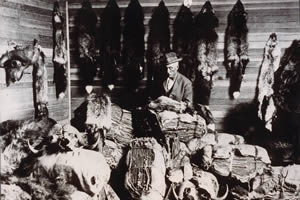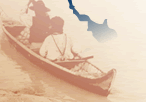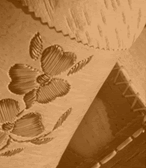|
Dogrib Roles in the Fur Trade |
|
|
With the arrival of fur traders, traditional roles began to change among the
Dogrib. Dogrib oral history tells us that, before the traders arrived, bands
formed around a great hunter. This individual was chosen for his superior ability
to lead and provide for the group. Generosity and a firm commitment to the welfare
of the group were also highly regarded in leaders.
The arrival of the Hudson's Bay Company and the North West Company created
new responsibilities for the chief. The chief now became a spokesman for the
group and middleman between his followers and the fur traders. This new status
for the chief was reflected in the title of Done
kawi  (the 'people's trader'). There were other distinctions too: whereas trading
chiefs like Bear Lake Chief traded almost exclusively in furs, others, like
Behcho K'aawi
(the 'people's trader'). There were other distinctions too: whereas trading
chiefs like Bear Lake Chief traded almost exclusively in furs, others, like
Behcho K'aawi
 ('Big Knife Trader'), traded only in secondary goods like dry meat and babiche.
('Big Knife Trader'), traded only in secondary goods like dry meat and babiche.
The early twentieth century brought a wave of 'free traders' into the North,
men who were not associated with the Hudson's Bay Company. This trend brought
an end to the done kawi; individual entrepreneurs known as nae do
('buy-and-sell men') now received goods from competing traders in exchange for
furs.
|
|
|
| |
 |
| |
|
| |
| | A Dogrib account of done kawi
"The Hudson's Bay Company used to give all kinds of supplies, clothing and ammunition
to the done kawi  .
If his bunch ran short of supplies, the done kawi could send two of his
men to Resolution or wherever. Those two men would say, '?ekawi sent us
for grub,' and the trader had to send what he was asked for back to the ?ekawi.
In the springtime or Christmas the ?ekawi paid back the trader with fur." .
If his bunch ran short of supplies, the done kawi could send two of his
men to Resolution or wherever. Those two men would say, '?ekawi sent us
for grub,' and the trader had to send what he was asked for back to the ?ekawi.
In the springtime or Christmas the ?ekawi paid back the trader with fur."
Source: Helm, June. "Patterns of Allocation among the Arctic Drainage Dene,"
in Essays in Economic Anthropology. Seattle: University of Washington Press,
1965. pp. 40-41.
| |
| |
|
|
|
 |
| (Ernest Brown Collection/Provincial Archives of Al | |
|

